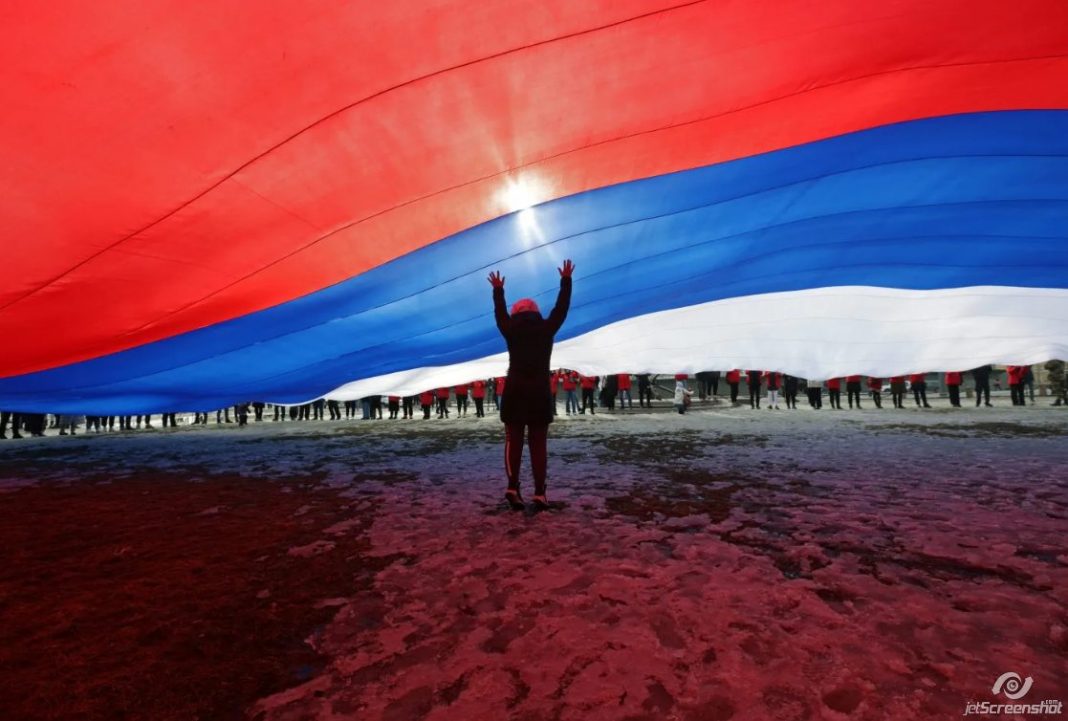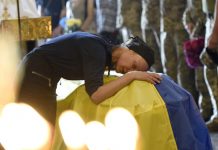By Elena Davlikanova, for CEPA
There are ways to understand, and be horrified by, Russian popular attitudes to the war, despite the regime’s best efforts to hide the truth.
Many in the West continue to rely on wishful thinking when it comes to the “Russian people” — a catchall term used to cover all the Russian Federation’s 190 ethnic groups. A lack of reliable opinion polls, and reassuring tales from liberals in exile, serve as an excuse for ignoring a simple truth — the majority of the population either can’t accept the prospect of defeat or don’t care about the fate of their supposed Ukrainian brothers.
Among 140 million people there will always be some who fight for basic human values, but they seem a minority unable to divert the country from its acceptance of authoritarian rule, opposition to the West, and the prioritization of colonialism over peaceful economic cooperation.
While polling by the Levada Center shows Russian acceptance of genocidal policies in Ukraine, it is believed in the West that the results are skewed by state domination of Russian media and fear of telling the truth. But an article drawing on views from the readers of Meduza, an independent website now published in exile following Kremlin efforts to close it down, should raise deep concern in the West. Worryingly, it reveals support for the war among Russian citizens who otherwise are not ardent supporters of Vladimir Putin’s regime.
Since the launch of the full-scale invasion, Ukrainians have attempted to address the Russian population directly and through social media to tell their side of the story. It is worth recalling that almost half of Ukrainians have relatives in Russia and that despite the war some conversations continue (albeit to little effect.)
In May, a group of Ukrainian researchers, including the author of this article, conducted an online survey of relations between citizens of Ukraine and Russia over the last decade (1,088 replies were received overall). Some 346 respondents shared conversations they had held with citizens of the Russian Federation since the full-scale invasion.
These revealed several major narratives: appropriating blame for the war to the US, European Union (EU), and NATO for provoking Russia and manipulating Ukraine; blaming the Ukrainian government, led by “a junky” and dominated by Nazis and other far-right extremists, for bombing Donbas and oppressing Russian-speaking people; justifying the decisions of the Russian leadership, who had prevented Ukraine’s imminent invasion of the Russian Federation; and admiration for Putin as a leader. They felt no sense of personal accountability since they see themselves as “small people”, who simply worry about their own wellbeing.
Get the Latest
Get regular emails and stay informed about our workEmail
Below are statements Ukrainians have heard from their relatives, friends, and colleagues from Russia in response to the acts of the Russian leadership since the all-out invasion began on February 24, 2022:
“Ukraine is to blame for lying down under the US, not Russia.”
“Russians shell only military targets, they do not touch civilians. And they attacked because we [Ukrainians] want to join NATO and [plural n-word] from Poland were fighting for us.”
“You [Ukrainians] are a victim of America. The Americans are using you as a bargaining chip.”
“You [Ukrainians] do not understand anything, you are being manipulated by the Pentagon.”
”It’ll be over soon, don’t worry. It’s all because of America. Zelenskyy simply did not want to reach an agreement with Russia.”
“Ukrainians, and I personally, have always wanted to attack Russians and launch the war, these are ‘preventive measures’. Russia has sufficient resources to ‘force peace.’”
“You [Ukrainians] will rebuild. There was no need to resist. Then everything would have been fine.”
“You must be bombed so that no mention of you is left. So that instead of Ukraine there is a radioactive safety zone from the aggressive West.”
“You started it. Why should we give you [Ukrainians] our historic territories?”
“We will never know who is right in this situation.”
“Our boys will save you!”
“When saving us [Ukrainians] is over, everything will be like the Soviet Union times.”
“Don’t go abroad, in a few weeks we [Russians] will occupy Poland and the Czech Republic.”
“I placed the letter Z on the avatar to support our [Russian] warriors.”
“Why should we suffer under sanctions?”
“The Russian people cannot influence things [and anyway] it’s scary to protest.”
“I am out of politics.”
“Now everything will be fine with you, Putin promised, I believe him, I love him!”
“I told you that you needed to move to Russia; now enjoy the projectiles falling on your head; as they say — ‘Here fascist! Have a grenade’ [a Russian saying].”
“I hope you get hit by a rocket. What a Nazi language you have, now I understand why they exterminate you.”
“This cleansing is for your own [Ukrainians’] benefit. It is the eradication of evil.”
“Ukraine never existed.”
1/7th of respondents reported that Russians who they spoke with openly condemned war:
“It’s terrible, it shouldn’t have happened, I’m very ashamed!”
“Forgive us! Our old man has lost his mind.”
“We, medical students, were banned from going to anti-war rallies under the threat of expulsion. How can a medic support the war?”
“I believe you; this is my country’s fault, but I am physically unable to help. I will no longer be able to communicate with you because they can put me in prison.”
“Russia sticks its smelly nose where the dog doesn’t poke. It interferes in the affairs of a neighboring state when everything is very bad within it.”
“I hope Ukraine wins. Wishing the insane old man dies as soon as possible.”
“Win as soon as possible and come to us to overthrow Putin!”
“After your victory, we will come to you to help you rebuild everything [Ukraine].”
If it is true that only a small percentage of people actively support the war, and a small percentage actively oppose it, the rest need to overcome their distorted perception of the past and the present, their weakness, fear, and apathy, otherwise the worst of Russia will prevail.
By Elena Davlikanova, for CEPA
*The study was conducted May 1-31 2023 by Olena Buchynska, Elena Davlikanova, Iryna Lylyk, and Oksana Yashkina.
Elena Davlikanova is a Democracy Fellow with the Center for European Policy Analysis (CEPA.) Her work is focused on analyzing opportunities for Ukraine-Russia reconciliation with regard to fascism and totalitarianism in Russia and their effects on Russia. She is an experienced researcher, who in 2022 conducted the studies ‘The Work of the Ukrainian Parliament in Wartime’ and ‘The War of Narratives: The Image of Ukraine in Media.’
Europe’s Edge is CEPA’s online journal covering critical topics on the foreign policy docket across Europe and North America. All opinions are those of the author and do not necessarily represent the position or views of the institutions they represent or the Center for European Policy Analysis.





